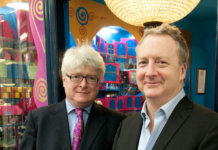
A few months ago, the New York-based magazine Rolling Stone decided for the first time in its history to seek an outside investor. The Wenner family, who have owned the famous music publication since it was launched in 1967, felt it would be a good time to bring in some fresh capital. The investor the family chose was BandLab Technologies, a Singapore-based music company co-founded and led by Meng Ru Kuok, the son of the Asian business tycoon Kuok Khoon Hong.
The deal was a classic family to family investment. Here’s what second generation Gus Wenner said shortly after the deal was signed: “We really were looking for a strategic partner. This was kind of as strategic as I could possibly find…” He meant that not only the music links between both investors were as strategic as Rolling Stone could possibly find, but also the family to family investment part.
The Rolling Stone and BandLab Technologies deal is part of a growing trend of families investing together to help them achieve the next stage of their growth ambitions. These deals might be driven by two family businesses deciding to work together like the Rolling Stone one, or wealthy families might use their family office to invest in a family business. Other times family to family investment involves families coming together to co-invest in business they feel they can add value to.
Of course, families investing with other families isn’t something new. Since the beginning of economic relationships, wealthy families have worked with other wealthy families to accumulate even more assets. The Rockefellers worked with the Vanderbilts, the Rothschilds with the Safras, and many lesser known families have equally prospered financially through working with other families.
But as the popularity of family business model has gathered momentum since the global financial crisis of 2008, the family to family investment boom has taken on much more significance. Unfortunately, there’re no official figures that state how many of these family to family investment deals are happening, but pretty much anyone who knows anything about the investment world will say it’s a growing phenomenon.
Here’s a selection of some other recent family to family investment deals. The family-controlled luxury conglomerate LVMH recently acquired an 80% stake in the German premium luggage manufacturer and family-owned Rimowa. LVMH’s family owner and CEO Bernard Arnault has often said that family businesses like buying other family businesses because the cultures are the same. In other words, they get each other’s business priorities.
Earlier this year, family-owned drinks group Davide Campari-Milano bought family-owned drinks group the Grand Marnier. It follows on from Campari buying the Sicilian family-owned group Fratelli Averna in 2014. In 2015, the family-controlled UK construction group Wates bought another family-controlled business called the Shepherd Group.
A classic example of co-investment among families was the 2015 purchase of The Economist Group. The Italian Agnelli family, represented through its investment group, Exor, teamed up with a branch of the Rothschild family, as well as the UK-based Schroder and Cadbury families, to buy a controlling stake in the well-known magazine and research group.
Family-controlled investment groups are perhaps leading this family to family investment boom more than any group. Groups like Exor, Investor AB, controlled by the Wallenberg family in Sweden, Cascade Investment, controlled by Bill and Melinda Gates, Kingdom Holding Company, controlled by Al-Waleed bin Talal in Saudi Arabia, have often invested in family-linked businesses. And of course, Warren Buffett’s Berkshire Hathaway has been a leading family business investor for many years. Many lesser known family offices are also getting into the act for the same reasons why their bigger counterparts are investing.
The current popular investment mantra of the importance of long-term returns fits very well into the family to family investment boom. Speak to pretty much any family office about their overall strategic investment priorities and they will place the importance of having a long-term perspective at the top, or at least near to it. So, is it any wonder that many of them are looking to acquire, or buy minority stakes, in family-controlled businesses, which personify a long-term vision more than pretty much any other business model?
The demand for long-term investment opportunities is also coinciding with the supply of such opportunities. Like Rolling Stone, many family businesses are looking to bring in strategic partners to help them grow their businesses in the years ahead. And where better to look than other families with spare capital and a willingness to invest.
This trend is also coming at a time when many other investments seem less appealing to families with substantial capital. Hedge funds and private equity funds have lost their allure among many wealthy families because these investments often lack transparency, are difficult to influence, and charge high fees, without necessarily the performance to justify them. Nor are public equity markets as appealing as they might have been in the past. Volatility and a lack of initial public offerings – with the number of listed US companies having almost halved in the past 20 years – have subdued interest in public markets from big investors like family offices.
Of course, pretty much ever investment trend goes in cycles – and without a doubt right now family to family investment is in the upward part of that cycle. How long will it last? No one knows, but it’s likely to be some time before it peaks.
And maybe it will never peak, because unlike other investments trends like hedge funds, or the tulip mania in the 17th century, family to family investing has an enduring quality about it. After all, there will always be wealthy families like the Rothschilds and the Arnault’s looking to deals with other families, which might have little to do with the investment fads of the day.
David Bain is the founder and editor of Family Capital www.famcap.com, an online news and analysis website covering family investment themes, family offices and family businesses.














